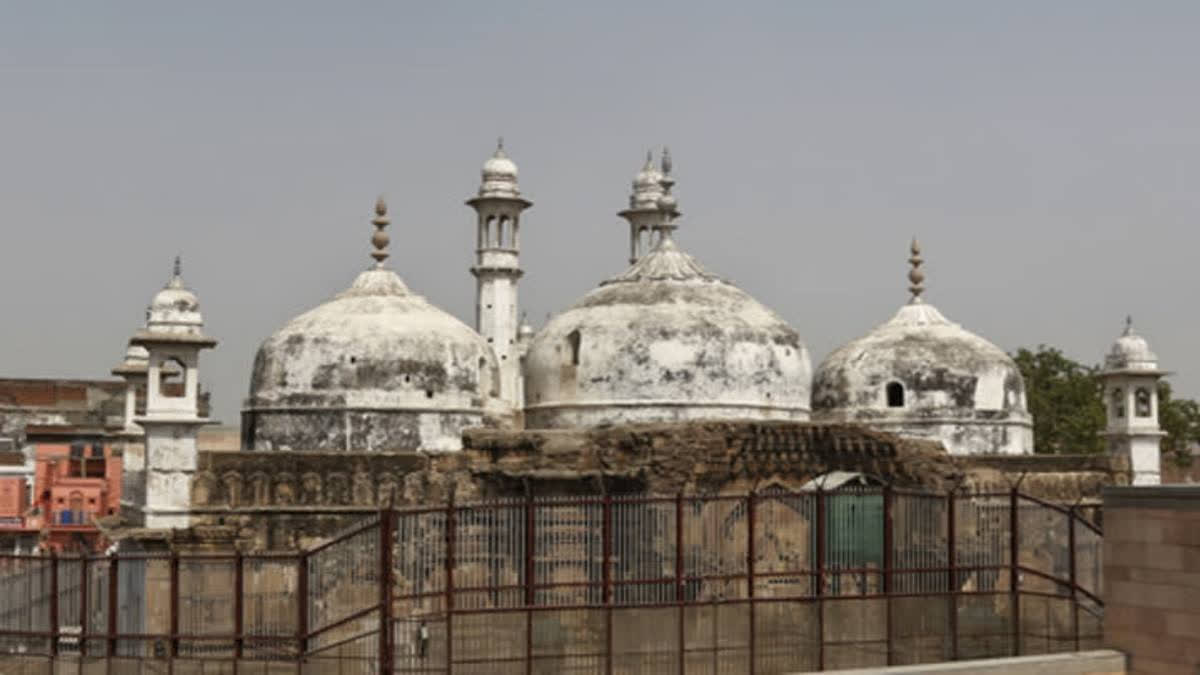Varanasi (Uttar Pradesh): The district court on Wednesday ruled that a priest can perform prayers before the idols in a cellar of the Gyanvapi Masjid here, a significant development in the legal battle over the mosque adjacent to the Kashi Vishwanath temple. The prayers will be conducted -- apparently at regular intervals -- by a "pujari" nominated by the Kashi Vishwanath temple trust and the petitioner who has claimed his grandfather offered puja at the cellar up to December 1993.
While the VHP welcomed the order, Muslim side counsel Mumtaz Ahmed said they will challenge it in the high court. The judge has said the plaintiffs can submit their objections before the court on February 8. The court has directed the local administration to make arrangements within seven days for prayers in the cellar. This will involve "proper arrangements" with metal barricades at the complex. According to Hindu side counsel Madan Mohan Yadav, the barricades before the Nandi statue facing the mosque's 'wazukhana' will be removed to make way.
The order by judge A K Vishvesha comes day after an Archeological Survey of India (ASI) report on the mosque complex was made public. The ASI survey, ordered by the same court, in connection with a related case, suggested that the mosque was constructed during Aurangzeb's rule over the remains of a Hindu temple. Wednesday's order was delivered on the plea of Shailendra Kumar Pathak who claimed that his maternal grandfather, priest Somnath Vyas, offered prayers till December 1993, advocate Yadav said.
He said the puja was stopped during the tenure of chief minister Mulayam Singh Yadav after the Babri Mosque in Ayodhya was demolished on December 6, 1992. The Vishva Hindu Parishad (VHP), Madhya Pradesh Chief Minister Mohan Yadav and Uttar Pradesh Deputy Chief Minister Keshav Prasad Maurya welcomed the "historic decision". The BJP refrained from commenting on the development, saying the matter is sub-judice. During the hearing, the Muslim sides disputed the petitioner's version. It said no idols existed in the cellar so there was no question of prayers being offered there till 1993.
The Muslim side had also countered the petitioner's claim that the basement was under his grandfather's control. The petitioner further claimed that in accordance with "vansanugat" (dynastic) his family had control of the cellar even during the British rule and they performed puja. In an earlier order on January 17, the Varanasi court had directed that the district magistrate should take charge of the cellar. But it had not then given any directions on the right to offer prayers there. Mumtaz Ahmed, who represented the Muslim side, said, "The district judge today gave its final verdict by giving the right of worship to Hindus. We will now go to the High Court against this decision."
Senior All India Personal Law board member Maulana Khalid Rasheed Farangi Mahali told reporters in Lucknow, "There is disappointment over this decision but doors of the upper court are open. Our lawyers will challenge this decision." In his reaction, VHP's Alok Kumar congratulated the Hindu society, saying, "We hope that after this, the court's verdict on the Gyanvapi case will also come soon. We are confident that the decision will come in favour of Hindus based on evidence and facts." Madhya Pradesh Chief Minister Mohan Yadav said this is an important day for Hindus emotionally.
"It is a matter of happiness. The Varanasi court order in the Gyanvapi case will in a way prove to be a milestone," Yadav told reporters here. Uttar Pradesh Deputy Chief Minister Maurya posted on X, "Shiva Devotees have got justice.... I heartily welcome the decision. Devotees have been waiting for this since 1993!". Hindu side advocate Vishnu Jain described the court decision as "historic." "The judgement is like the past order in the Ayodhya case. The right to worship given to Hindus in Gyanvapi is our great victory," Jain said.
- " class="align-text-top noRightClick twitterSection" data="">
Read More



